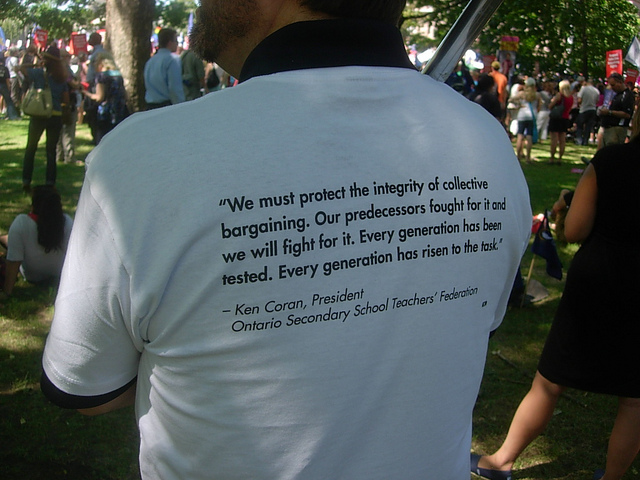It’s always diverting when an apparently effete workforce, like foreign service workers at Canadian embassies, hit the bricks — a hopelessly out-of-date term — i.e., go on strike. It’s your basic fish-out-of-water scenario, as they say at the fall TV launches. In this case, embassy employees are refusing to issue visas to foreign students coming here, or tourists travelling to family weddings, etc. That causes inconvenience, anger, sorrow as well as financial loss to strapped universities. The union is demanding pay raises to lift them to the same level as other government employees doing similar jobs. As usual, the employer — the Harper government — holds almost all the cards.
They can simply hold their line as the anger and pain mounts. They don’t care so much if people get angry, or how long it lasts, as they do about who gets the blame — which will be the union. Meanwhile they posture about being on everyone’s side. The minister involved, Tony Clement, says he wants a solution that “respects the interests of both taxpayers and foreign service union members.” There you go, union: he’s put you in check, possibly checkmate.
Why doesn’t the union protest loudly that they’re taxpayers, too? Or that fairness in pay is something anyone who has a job can identify with and support. Plus: higher wages lead to more demand in the economy, therefore more jobs and taxes paid, lowering deficits, etc.
In other words, why don’t they contest the battle for the public mind? I don’t know why but they don’t, or rarely do. They seem to have lost track of that tactic. It went missing in the Ontario teachers conflict this year, too. The unions made little or no effort to explain their case and enlist parents, students and citizens on their side. That left the McGuinty government with the role of defender of the taxpayers. It’s not inevitable. The Chicago teachers’ union laboured for wider support and won their strike with it.
This matters not just because it would be smart for unions. It’s because they, for about a century, have been central to general social improvement. They provided inspiration, resources, organization: without them there would not have been public health care, universal pensions, health and safety laws, the whole panoply of the (now disputed) welfare state. It’s hard to imagine today how central they recently were to the electoral and legislative calculations of all political parties, not just Democrats in the U.S., or Liberals and NDP here.
But wait a minute. Am I languishing nostalgically in the past? If unions don’t play that “progressive” role as publicly as they once did, there’s now the Internet. Organizations like Avaaz, Change.Org, MoveOn.Org, Leadnow in Canada: they appeal to the public, in the public interest, to sign petitions, donate money, sometimes even get out in the street. I’m not sure why I feel these initiatives can’t fill the union role, maybe I am just nostalgic. Nevertheless:
1) “Action,” or just action, on the Internet is disembodied but human beings still inhabit bodies. Sure there’s such thing as virtual reality, but it isn’t basic human reality. People are only really engaged or “there” when they feel the space they inhabit and how they share it with others. The Internet saps some of that vitality. All major protests in recent years (the Arab Spring, Spain, Greece, etc.) used social media to bring people into the streets where they “occupied” space together. This is why union experiences can be, though they rarely are, transformative.
2) The space people share is often related to work, whether it’s loved or hated. That won’t change anytime soon, so work-related connections matter.
3) All key social issues today relate to challenging corporate wealth and power, that is, they have an economic dimension. It’s hard to imagine mounting any real challenge without an economic counterforce, which is what unions are.
It’s a daunting challenge for unions. Today they barely exist in the public mind. A few decades ago, if you asked people to free-associate with “union” you’d get many responses: strikes, chants, acronyms, leaders, songs. Now, at least among the young, you’d probably get mostly blanks. Nothing. On the other hand, a blank slate isn’t the worst place to start.
This article was first published in the Toronto Star.
Photo: andres musta/flickr



